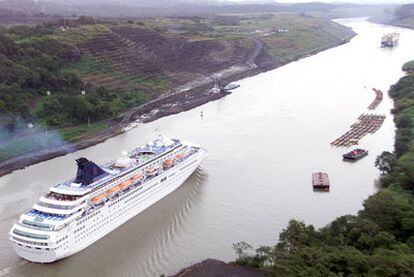US tried to block bid for Panama job
WikiLeaks reveals how State Department fought to stop Sacyr from getting contract
The US State Department, along with its embassies around the world, did its utmost to prevent Spanish construction company Sacyr from winning a contract to extend the Panama Canal, undertaking a political pressure campaign for US company Bechtel to get the work, cablegrams leaked by WikiLeaks reveal.
But despite its best efforts, in July 2009, a consortium led by Sacyr Vallehermoso won the contract to build a third set of locks for the Panama Canal ? which links the Pacific and Atlantic oceans through a series of canals ? with a 2.4 billion euro bid. The contract was for a sought-after centerpiece of an expansion plan that is to conclude in 2014.
Documents leaked by whistleblower site WikiLeaks to EL PAÍS show that the US embassy in Panama City worked "implacably" on behalf of Bechtel. The embassy is said to have used intermediaries to contact the bidding companies ? which included Spanish construction firm ACS ? to try to find out their estimate for the cost of the job, and what their bid would be. The embassy was also in contact with the independent assessor of the process, a US company, as well as with the Panama Canal Authority, which manages the waterway.
At the same time, the US State Department spread rumors, which were published in the international media, claiming that Sacyr was technically bankrupt and that it lacked the resources to carry out the work. After Sacyr was awarded the contract, the US embassy in Panama is reported to have told the media that the company only won the bid after the intervention of the Spanish government. One document says that the Panamanian authorities themselves had also expressed serious concerns as to the capacity of Sacyr to carry out the work.
The leaked cables between the State Department in Washington and the embassy in Panama City highlight the strategic importance of the extension of the canal. Not just because much of the world's maritime traffic trade with US ports passes through it, but also because had Bechtel won the contract, it would have bought material worth an estimated 800 million euros from US companies.
The canal, designed in 1904 for ships with a 267-meter (875-foot) length and 28-meter (92-foot) beam, is too small to handle the "post-Panamax" ships that are three times as big, making it necessary for some time now to expand by building the new set of locks. The Panama Canal Authority wants to double transit capacity.
The 80-kilometer (49-mile) canal, which currently handles about five percent of world trade, has been under Panamanian management since December 31, 1999, when the United States surrendered it in keeping with the 1977 Torrijos-Carter treaties.
Several confidential documents show how the US embassy used information from CH2MHill, the US company tasked with assessing bids. The embassy's investigations led it to wrongly conclude that the only credible candidates for the expansion work were ACS and Bechtel, given that Sacyr was "on the brink of bankruptcy."
According to CH2MHill, Sacyr had "sent a technical proposal that could not even be minimally acceptable." As it turned out, Sacyr's offer won out, based on a range of criteria, both technical and financial.
The embassy noted in its communication with Washington that "Sacyr is considered to be bankrupt, and is being backed by the Spanish government." Sources at Sacyr say that the company had sold a controlling share in its affiliate Itínere in 2008, a move that had significantly reduced its debt. In 2009, the year that the contract was awarded, Sacyr's top 10 public works projects were all overseas. For that financial year, the group's turnover grew by nine percent on the previous year, registering a profit of 506 million euros.
The United States also complained that Spain's Industry Ministry had underwritten Sacyr's costs, charging that this was probably illegal. The Department of State asked the US embassy in Madrid to look into the possible use of taxpayer's money to shore up Sacyr's bid.
Sacyr says that the Industry Ministry aided it by supplying reinsurance through CESCE, a public limited company set up to insure Spanish companies against the risks of non-payment stemming from the sale of their products and services on both the domestic and foreign markets. Sacyr points out that Bechtel was insured by AIG, which came close to bankruptcy last year as a result of the global financial crisis and its links to Goldman Sachs.
When Sacyr was finally awarded the contract, US ambassador to Panama, Barbara Stephenson, told her colleagues at the State Department in Washington that this pointed to "the growing influence of Spain in Panama. [...] We suspect that Sacyr, which has financial problems, was only able to offer a surprisingly low price with the support of the Spanish government. [...] Sacyr's victory will complicate our bilateral relations with Spain both politically and economically."
The embassy even looked into the possibilities of appealing against the Panamanian authorities' decision, but had to admit that its low scoring on technical grounds could have been due to using an overly innovative design, and that there were no grounds on this basis to appeal.
According to Bechtel, Sacyr's offer of 2.4 billion euros "wasn't enough to buy the cement." The US company's bid was 3.1 billion euros. It told the US embassy that it suspected Sacyr would attempt to renegotiate the contract once work had begun.
The US embassy continued its campaign against Sacyr through other means even after the contract had been awarded. "We cannot rule out the possibility that the Spanish government has provided Sacyr with other types of guarantees that will give it access to financing to carry out the project to protect Spanish jobs, and preventing the massive shock to the Spanish banking system that the collapse of Sacyr would provoke."











































